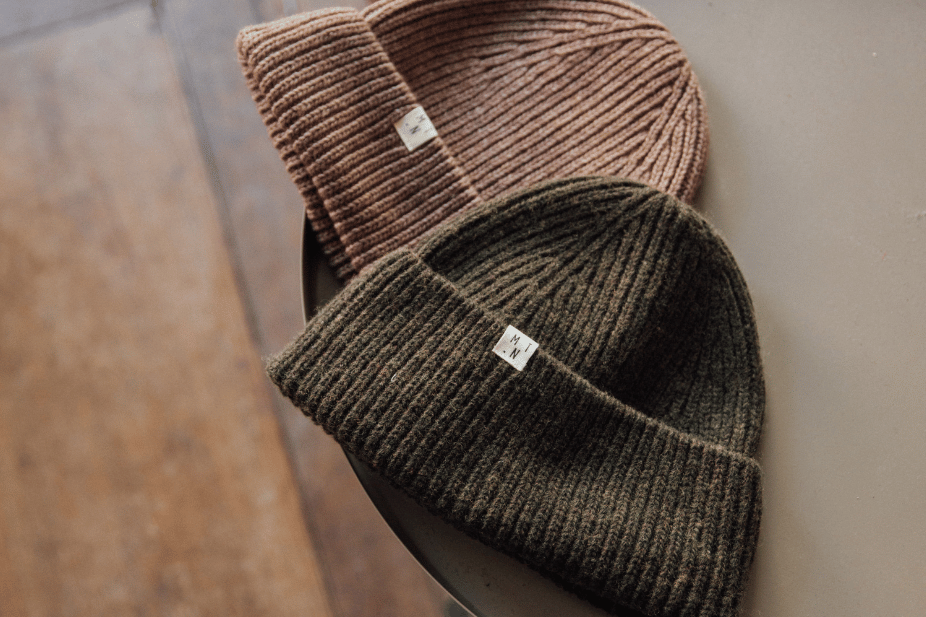
Sustainable materials for winter
Sustainable materials for winter – Recycled wool, organic cotton & recycled polyester
As the days grow shorter and the temperatures drop, the desire for warm clothing – inside and out – increases. At NUVONDA, you'll find winter fashion that not only keeps you warm through frost and fog but also takes responsibility for your well-being.
Because for us, sustainable fashion means: materials that are durable, conserve resources and simply look good.
Three fabrics are particularly in focus: recycled wool , organic cotton , and recycled polyester . Three materials with their own unique strengths – and a shared philosophy: conscious consumption without compromising on style and comfort.
1. Recycled wool – warmth with a story
Few materials have as much character as wool. It provides reliable warmth, regulates temperature, and feels natural. But producing new wool is costly – for animals, the environment, and energy consumption. The sustainable alternative: recycled wool .
Here, old wool textiles, production remnants, and offcuts are reprocessed, spun into new yarns, and processed into high-quality fabrics. This saves water, CO₂, and energy – and makes each garment a unique piece.
Advantages:
-
especially warm and breathable
-
Manufactured in a resource-saving and energy-efficient manner
-
durable and robust
Disadvantages:
-
May scratch easily (depending on the finish)
-
requires some care in maintenance.
You can find recycled wool mainly in coats , cardigans and overshirts – for example at ECOALF or ROTHOLZ , where recycling meets timeless design.
2. Organic cotton – Naturally soft, responsibly produced
Organic cotton is the epitome of natural sustainability. It is grown without synthetic pesticides and fertilizers, uses up to 90% less water compared to conventional cotton, and ensures safe working conditions in agriculture.
The result is fabrics that are soft, skin-friendly, and durable – ideal for winter basics like knitwear, sweatshirts, or fleece. And that's precisely why organic cotton is a true bestseller at NUVONDA.
Advantages:
-
especially pleasant on the skin
-
breathable and robust
-
environmentally friendly cultivation
-
socially responsible production
Disadvantages:
-
slightly more expensive than conventional cotton
-
lower yields per cultivated area
Our brands like MATONA , Dirts or NIKIN use organic cotton in such a way that sustainable fashion looks really good – clean, modern and with that certain something.
3. Recycled polyester – where function meets environmental awareness
Sometimes fashion demands technical strength – especially when it comes to winter jackets, fleece, or outdoor wear. Polyester is ideal for this: robust, water-repellent, and quick-drying. The problem: conventional polyester is petroleum-based. The solution: recycled polyester , made from old PET bottles or textile scraps.
Modern processes transform it into a new, high-quality thread – using up to 50% less energy. And best of all: recycled polyester can be endlessly recycled without any loss of quality.
Advantages:
-
lightweight, durable & easy to care for
-
saves energy and fossil resources
-
Ideal for fleece and outdoor jackets
Disadvantages:
-
not biodegradable
-
It can release microplastics during washing (Tip: Use a laundry bag!)
At NUVONDA you'll find many fleece jackets, vests and winter jackets made from recycled polyester – for example from Arniko or Ecoalf . They combine function with responsibility – for the city, the mountains or simply your everyday life.
Conclusion – Staying warm and sustainable throughout the winter
Whether it's recycled wool, organic cotton, or recycled polyester – sustainable materials are no longer a niche product, but the future of fashion. They stand for quality, responsibility, and a more conscious use of resources.
Our winter pieces are not only designed to keep you warm, but also to make a statement: for fair production, for durability, for design with attitude.




